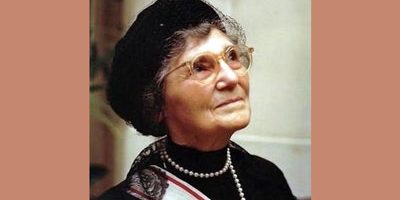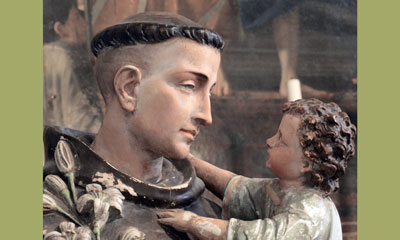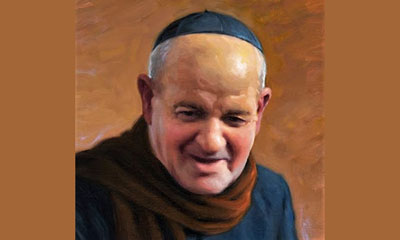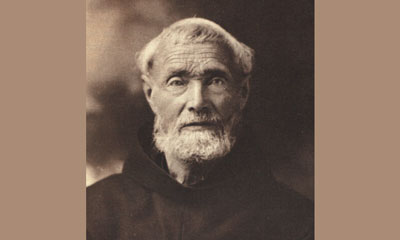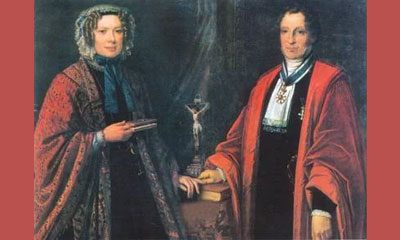September 14, 2016
Zita of Habsburg
Dear Friends,
“Without those who have gone before us, we would be nothing,” Zita of Bourbon-Parma used to say, thinking of her mother and aunts, exemplary and radiant women, princesses of the royal family of Portugal. Their maxim was: “Nothing lasts in this world, nothing is more uncertain than temporal power. What counts is love, and nothing else”. But Zita s gratitude was above all for her husband Charles of Habsburg-Lorraine, great-nephew of the Emperor Francis Joseph of Austria. Having become emperor himself in the turmoil of the First World War, Charles, faithfully supported by his wife, attempted the impossible—to bring peace back to his people and to the entire world. He died in exile in 1922, and was beatified by St John Paul II on October 21, 2004. Zita, the last empress of Europe, outlived him courageously for sixty-seven years.
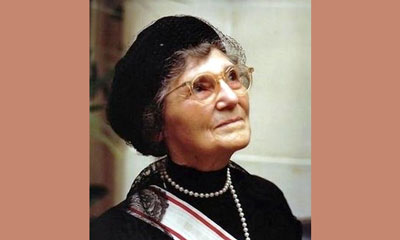 The fifth of twelve children, Zita-Maria of Bourbon-Parma was born on May 9, 1892 in Pianora, Italy. She was the daughter of Robert of Parma and his second wife, Maria-Antonia de Bragance. Her family origins were often brought up: “The people of Pianora,” reported Zita, “considered us entirely theirs. Our friends in Schwarzau-am-Steinfeld considered us to be Austrians. In Chambord, we were claimed as French (the Bourbon-Parmas descend in a direct line from Louis XIV). All this appeared both strange and beautiful to us. But Papa had to set the record straight now and then: we are French royalty who have reigned over Parma.” The exercise of political power, which had long been the lot of Zita s family, should be for the common good: “For the lay faithful, political involvement is a worthy and demanding expression of the Christian commitment of service to others. The pursuit of the common good in a spirit of service, the development of justice with particular attention to situations of poverty and suffering, respect for the autonomy of earthly realities, the principle of subsidiarity, the promotion of dialogue and peace in the context of solidarity: these are the criteria that must inspire the Christian laity in their political activity” (Compendium of the Social Doctrine of the Church, CSDC, # 565).
The fifth of twelve children, Zita-Maria of Bourbon-Parma was born on May 9, 1892 in Pianora, Italy. She was the daughter of Robert of Parma and his second wife, Maria-Antonia de Bragance. Her family origins were often brought up: “The people of Pianora,” reported Zita, “considered us entirely theirs. Our friends in Schwarzau-am-Steinfeld considered us to be Austrians. In Chambord, we were claimed as French (the Bourbon-Parmas descend in a direct line from Louis XIV). All this appeared both strange and beautiful to us. But Papa had to set the record straight now and then: we are French royalty who have reigned over Parma.” The exercise of political power, which had long been the lot of Zita s family, should be for the common good: “For the lay faithful, political involvement is a worthy and demanding expression of the Christian commitment of service to others. The pursuit of the common good in a spirit of service, the development of justice with particular attention to situations of poverty and suffering, respect for the autonomy of earthly realities, the principle of subsidiarity, the promotion of dialogue and peace in the context of solidarity: these are the criteria that must inspire the Christian laity in their political activity” (Compendium of the Social Doctrine of the Church, CSDC, # 565).
The best remedy
Zita had fond memories of her childhood: “My childhood was extremely happy and gay… The annual move from Austria to Pianora, with the return each spring to Schwarzau where we spent the summers, was for us children the major event.” She would recall: “If, during our vacation, we studied too little for the liking of our teachers, we had to sew, darn and patch. And not only our own clothes, but also those of the elderly and sick in Schwarzau.” The girls also looked after the sick who had no families: “Evenings we often came home exhausted, and had to be disinfected so as to avoid contaminating the young ones. When this cleaning lasted too long, our mother reminded us: ‘Charity is the best remedy against the risk of contagion. ”
There were also times for relaxation, when the royal children could picnic, swim and play with the other children of the village until evening. The formation was firm, but full of love: “In our eyes, being deprived of dessert—which happened rarely—was the worst punishment. Since meals were simple, a small sugared treat was a real feast… My mother was strict, but we adored her. Papa was gaiety and goodness personified. He never struck us, but when he had to scold one of us, it touched us deeply.” Among themselves, the children would laugh and talk; but with invited guests, they were expected to respect their elders and bow properly. The young highnesses quickly learned to gauge the importance of the guests by the volume of dust raised by the cortège that brought them. “Of course, we often preferred those which raised less dust!”
Zita was in boarding school at the convent of Zangberg, in Upper Bavaria, when she learned that her father was dying; he returned to God on November 16, 1907, before she was able to see him. In 1909, her mother sent her to study in Ryde on the Island of Wight, with the nuns of Solesmes, at the time in exile there. Her maternal grandmother, who had entered the monastery after she was widowed, was the Prioress there, and her sister Adelaide had recently become a nun. Zita received an excellent education there in philosophy, theology and music. Her soul felt drawn to the cloister.
Prophecy
However, Zita and Charles, who had known each other since childhood, were enjoying seeing each other more and more. In 1911, the archduke proposed to the young princess, offering her an engagement ring which Zita put into her pocket with a mischievous “Thank you!” On June 24th, Zita and her mother were received in audience by Pope Pius X, who said to the young girl, with a smile: “So you are going to marry the heir to the throne?” Three times, Zita tried to disabuse him: “Most Holy Father, my fiancé is the archduke Charles; the archduke heir is Francis Ferdinand”. But the Pope did not change his words: “I am extremely happy that Charles is the reward God has given Austria for her services to the Church.” Leaving the audience, Zita whispered to her mother: “Thank God, the pope isn t infallible when it comes to politics!” Later she would have to admit: “I testified during the beatification process for Pius X that it was a prophecy that fully came true.”
Attending an air show outside Vienna, the young fiancés received an ovation. Zita s face darkened: “These cheers sound like the shouts of an insurrection,” she remarked. Charles was surprised, but she then mentioned the fall of her family in Parma and that of the Bragances in Portugal: “We must be realistic, our life is fragile and power is ephemeral.” Charles was silent for several minutes. He was weighing the words. “I think I understand what you mean… but in Austria, things are different. Please, let s no longer speak of it!” Zita would note: “For years we did not speak of it. It was only on March 24, 1919, just as we reached the border to begin the hell of our exile, that Charles said to me: ‘You were right… I then immediately understood what he meant.—‘How I would rather have been wrong , I quietly responded. It was the last word of our dispute, or rather of the longest of the disagreements we ever had.
”Zita and Charles were married on October 21, 1911 with all the pomp called for by one of the greatest courts in Europe. The honeymoon of their highnesses consisted of driving around the Austrian-Hungarian Empire by car. Charles was able to express himself in the seventeen languages spoken in the empire, and he knew six of them perfectly; Zita was fervently learning those she did not yet know. On November 20, 1912, she gave birth to Otto, the first of their eight children. Charles had returned to his life as a dragoon officer, all the while growing closer to his uncle Francis Ferdinand. For a long time already, the archduke heir to the throne would willingly share his political views with his nephew in order to prepare him for his future responsibilities.
“In the context of the laity s political commitment,” notes the Compendium, “particular attention must be given to preparing believers to exercise the power that will be theirs, especially when they are entrusted with such duties by their fellow citizens… The exercise of authority must take on the character of service to be carried out always in the context of moral law for the attainment of the common good. Those who exercise political authority must see to it that the energies of all citizens are directed towards the common good; and they are to do so not in an authoritarian style but by making use of moral power sustained in freedom” (CSDC, 567).
The ultimatum
One evening, during a family dinner, Francis Ferdinand confided to his nephew: “I m going to be assassinated! Charles, certain documents, locked in a safe, should go to you. They are reflections, projects, ideas, perhaps they will be useful to you. But don t say anything, I don t want Sophie to be sad.” The heir to the throne had married Sophie Chotek—it was a morganatic marriage, for the bride did not have sufficient claim to nobility to become empress; consequently their children could not be heirs to the throne. Zita then understood that there was a risk that Charles would succeed his uncle as head of the empire much sooner than they had expected. On June 28, 1914, Charles and Zita were grieved to learn of the assassination of the prince heir and his wife in Sarajevo, by a Serbian nationalist. “We were strangely torn apart,” remembered Zita. “On one hand, we had to do everything possible to promote peace. This was what the assassinated heir to the throne would have wanted. On the other hand, as one forgets all too easily with the passage of time, a great power like Austria-Hungary could not allow the heir to the throne, the very incarnation of its future, to be assassinated! In such a situation, no government could have acted as though nothing had happened!” The emperor, Francis Joseph, thought therefore that he could not avoid the duty of justice and, thinking he could locally limit the conflict, gave Serbia an ultimatum which would trigger the various alliances and launch the great European war. Zita s family was divided: three sons fought in the imperial army allied with Germany, while the two eldest, Sixte and Xavier, rejected by the French Republic as Bourbon princes, would fight in the Belgian army. Zita hid her emotion during the family s last evening gathering on the terrace in Schwarzau. Xavier noted in his journal: “Never had we been so aware of how solid our bonds were as at that hour. We fight on entirely different fronts, and yet, we are all on the side of those who defend Europe against those who would destroy our continent.”
During the war, Zita was charged with inspecting hospitals and preparing a detailed report. The conditions rapidly became deplorable. Having predicted a disastrous outcome to the war, Emperor Francis Joseph sought a way to reestablish peace, but his counsellors and the spirit of the people, influenced by the German propaganda, were opposed. He was still working towards this end when he died, at the age of 86, on November 21, 1916. Charles then became emperor. Zita was animated with the same spirit of faith as her spouse: “A thousand forces, unique power!” she would say. “All the forces that are stirred up around us, pushing or holding back, are nothing compared to the Unique Power (God) who rules over us. Emperor Charles was in His service”. The crowning of the sovereigns of Hungary in Budapest, on December 23, 1916, was reminiscent of the transfiguration of Jesus on Mount Tabor before His Passion. The crown of the queens of Hungary was placed on the head of Zita, then the crown of St Stephen, first king of Hungary, with which Charles was just crowned, was laid on her right shoulder by the Archbishop Primate who said: “Receive the crown of sovereignty, so that you may know that you are the spouse of the king and that you must always take care of the people of God. The higher your station, the more you must be humble and remain in Jesus Christ.” The pomp of these ceremonies did not make the royal couple forget the sufferings of the people tried by the war: the eighteen dishes of the banquet were only presented to the dinner guests, before being sent to the wounded soldiers in the hospital of Budapest; the traditional ball was cancelled.
Zita consoles her people
The new emperor rapidly took over effective command of the army; thanks to his prudence, he spared hundreds of thousands of lives. On her side, Zita comforted her people and obtained for them all the material support in her power. Starting in 1917, the emperor tried to make a separate peace treaty between Austria and the Allies (France, England, and Italy). To this end, he sent princes Sixte and Xavier, on several occasions, to the governments of France and England. Unfortunately, various political intrigues foiled these attempts, which would have saved countless lives.
“The fifth commandment forbids the intentional destruction of human life. Because of the evils and injustices that accompany all war, the Church insistently urges everyone to prayer and to action so that the divine Goodness may free us from the ancient bondage of war. All citizens and all governments are obliged to work for the avoidance of war. However, as long as the danger of war persists and there is no international authority with the necessary competence and power, governments cannot be denied the right of lawful self-defense, once all peace efforts have failed” (Catechism of the Catholic Church, 2307-2308).
In October 1918, a Communist instigated revolution broke out in Budapest and the empire quickly began to fall apart. On November 3rd, an armistice was signed between Austria-Hungary and the powers of the Entente. As the revolution reached the Austrian capital, most of the imperial guards abandoned their posts. The cadets from the military school offered themselves spontaneously to guarantee protection of the imperial palace of Schönbrunn, to the great consolation of Zita who was moved by these young men whose courage surpassed that of their elders. Several thousand socialist workers, cleverly manipulated by republican agitators, demanded, “in the name of the people,” the departure of the Habsburgs. The emperor refused to shed the blood of his own people which had already been spilled in such abundance, and, on November 11, 1918, he renounced his functions, without however abdicating. The imperial family took refuge in a hunting cabin where it was exposed to danger, cold, malnutrition and sickness. The British Lieutenant-Colonel Strutt, charged by the British government with improving the living conditions of Charles and Zita, became a valued friend. In the face of revolutionary threats, he advised the sovereigns to leave the country. Charles resolved to do so on March 24, 1919. The exile began in Switzerland. Twice he tried, with the moral support of Pope Benedict XV, to restore the Hungarian monarchy, but in vain. The Allies then exiled Charles and Zita to the island of Madeira. They settled there on November 19, 1921 with a few servants, but without their children who would follow them later. Their personal possessions were stolen, and they received none of the financial compensation which had been promised. The winter climate was cold and humid, the house poorly heated. On March 9, 1922, the emperor caught pulmonary congestion, and died on April 1st, the first Saturday of the month, day consecrated to the Immaculate Heart of Mary.
A great duty
On May 13th, anniversary of the first apparition of the Blessed Virgin in Fatima, Zita consecrated her family to the Immaculate Heart of Mary before leaving Madeira for Spain. Henceforth, she was regent for her son Otto: “I have a grave political duty, perhaps my only one. I must rear my children according to the spirit of the emperor, making them good men who fear God. The history of peoples and dynasties—which is not measured in single lifetimes, but in much longer periods—must inspire us with confidence.” In August 1922, the imperial family established itself in Lekeitio in the Spanish Basque country, relatively close to Lourdes which Zita so loved. In 1929, Zita set up household in Belgium, near Louvain. There she led a country life regulated by a simplified etiquette, tended her roses, and sometimes would herself look after the twenty-five goats and sheep. For her children, she chose French-speaking Catholic schools. Otto would earn a doctorate in political and social sciences at the University of Louvain in 1935. On November 20, 1930, having reached adulthood, he became the head of the House of Habsburg.
In 1938, Hitler invaded Austria to create the Anschluss (annexation in view of the political unification of the peoples of “Greater Germany”). The dictator, born in Austria, always hated the Habsburgs. On April 22nd, Otto was condemned to death for high treason due to his hostility to the Reich. On May 9, 1940, the empress s birthday, the Germans attacked Belgium. On the 10th at dawn, bombers from the Luftwaffe flew over the imperial residence. The seventeen occupants left in haste for France in three cars. Two hours later, the house was on fire; for Otto, it was a “little attention from Hitler.” The family embarked for New York, then settled near Quebec, where the four youngest would finish their studies in the Catholic university. The four eldest earned their livings and defended the interests of their peoples in the United States or England. The empress represented Otto to President Roosevelt; on September 11, 1943, the latter welcomed her to Hyde Park. Zita pleaded for Austria and for a federation of the Danubian peoples. She also devoted herself to raising funds and supporting her subjects through various forms of aid. At Christmas 1948, she settled near New York and rendered a final political service to the Austrian people. Having heard that the Senate intended to exclude her country from the Marshall Plan, due to the so-called enthusiastic welcome it gave to Hitler in 1938, the empress convinced fifty or so wives of senators to influence their husbands to recognize the truth. As a result, the funds for Austria were voted through.
Amongst the nuns
The weddings of three of the children brought the family back to Europe. In 1953, Zita decided to settle in the chateau of Berg, property of the grand dukes of Luxembourg. Having been a Benedictine oblate of Saint Cecilia of Solesmes since 1926, she felt a renewed attraction to the cloister. The abbot of Saint Peter of Solesmes persuaded her however not to leave the world, due to her social position which allowed her to work in favor of a Europe whose identity is unthinkable without Christianity. However, thanks to an indult from Pius XII, Zita would be able to stay for long periods with the nuns, in total over three years. Her grand-daughter Catherine, seeing her behind the grille in the parlor, cried: “Grandma, you are in prison?!”—“My child,” replied the empress, “am I the one in prison, or is it you?” In 1959, political authorities refused her permission to attend her mother s funeral in Upper Austria, on an estate belonging to the Bourbon-Parma families. During this period, Zita was staying alternately with her children in Bavaria or in Brussels. In 1962, she settled in Zizers, in the Swiss county of Grisons.
The empress rose every day at 5 AM and attended several Masses, meditating on the Passion of Jesus, using the fifteen prayers of St. Bridget, and assiduously reciting her rosary. In 1982, a decree of the High Court of administrative justice acknowledged that the law of exile against the Habsburgs should not have included Zita, who was a member of this dynasty only through marriage. Her triumphal return to Austria the same year, after sixty-three years in exile, was among her greatest joys. On November 13th, more than 20,000 people attended the Mass celebrated in her presence in St Stephen s Cathedral in Vienne. Feeling that her having been forced into exile did not authorize her to abandon the mission she had received from God, she had never renounced her titles. However, her health was declining; she lost her sight and moved with difficulty. But those around her bore witness to her great patience, as she awaited with serenity the death that would allow her to be reunited with her spouse. She died on March 14, 1989, at the age of 96, and was interred in the crypt of the Capuchins of Vienne, with the imperial ritual due to her rank. Her heart lies with that of Charles at the abbey of Muri, in the diocese of Basel. A process for her beatification was opened in 2009. Any graces obtained through her intercession may be made known to the Association for the Beatification of the Empress Zita, Abbaye Saint-Pierre, 1 Place Dom Guéranger, 72300 Solesmes, France.
May we, through her example, learn how to serve God and His kingdom for the good of our country and that of Europe, even in the midst of the most unfavorable human circumstances.


